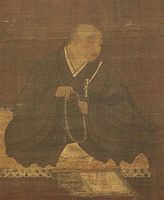Hōnen
| Wylie | Hōnen |
|---|---|
| English Phonetics | Hōnen |
- 法然
- Genkū
- 源空
| Birth: | 1133 |
|---|---|
| Death: | 1212 |
| Place of birth: | The Mimasaka province of Japan in the part of Honshū that is today northeastern Okayama Prefecture |
Tibetan calendar dates
- Religious Affiliation
- Founder of the Jōdo-shū (The Pure Land School), a branch of Pure Land Buddhism
- Students
- Benchō (1162–1238), founder of the main Chinzei branch of Jōdo-shū. Often called Shōkō. Exiled in 1207 to Kyushu · Genchi (1183–1238), Hōnen's personal attendant, and close friend of Benchō · Shōkū (1147–1247), founder of the Seizan branch of Jōdo-shū. Not exiled · Shinran (1173–1263), founder of the Jōdo Shinshū branch of Pure Land Buddhism. Exiled to Echigo Province in 1207 · Ryūkan (1148–1227), founder of the many-recitation or Tanengi branch of Jōdo-shū · Chōsai (1184–1266), founder of the Shōgyōhongangi branch of Jōdo-shū which believed that all Buddhist practices can lead to rebirth in the Pure land · Kōsai (1163–1247), promoted the controversial Ichinengi, or "single-recitation" teaching of Jōdo-shū. Expelled from Honen's community before the exile of 1207 · Gyōkō (?), another proponent of Ichinengi doctrine. Exiled to Sado in 1207 · Rensei (1141–1208), formerly a notable samurai named Kumagai no Jirō Naozane who had fought at the Battle of Ichi-no-Tani and killed the Heike leader Taira no Atsumori · Kansai (1148–1200) · Shinkū (1146–1228) · Anrakubō (? -1207), executed during the purge of 1207 · Jūren (?), executed along with Anrakubō in 1207
Other Biographical info:
- Wiki Pages
- Person description or short bio
- Hōnen was the religious reformer and founder of the first independent branch of Japanese Pure Land Buddhism called Jōdo-shū (浄土宗, "The Pure Land School"). He is also considered the Seventh Jōdo Shinshū Patriarch.
Hōnen became a Tendai initiate at an early age, but grew disaffected and sought an approach to Buddhism that anyone could follow, even during the perceived Age of Dharma Decline. After discovering the writings of the Chinese Buddhist Shandao, he undertook the teaching of rebirth in the pure land of Amitābha through nianfo or "recitation of the Buddha's name".
Hōnen gathered a wide array of followers and critics. Emperor Tsuchimikado exiled Hōnen and his followers in 1207 after an incident regarding two of his disciples in addition to persuasion by influential Buddhist communities. Hōnen was eventually pardoned and allowed to return to Kyoto, where he stayed for a short time before his death. (Source Accessed October 17, 2019)
Expand to see this person's philosophical positions on Buddha-nature.
| Is Buddha-nature considered definitive or provisional? | |
|---|---|
| Position: | |
| Notes: | |
| All beings have Buddha-nature | |
| Position: | |
| If "Qualified", explain: | |
| Notes: | |
| Which Wheel Turning | |
| Position: | |
| Notes: | |
| Yogācāra vs Madhyamaka | |
| Position: | |
| Notes: | |
| Zhentong vs Rangtong | |
| Position: | |
| Notes: | |
| Promotes how many vehicles? | |
| Position: | |
| Notes: | |
| Analytic vs Meditative Tradition | |
| Position: | |
| Notes: | |
| What is Buddha-nature? | |
| Position: | |
| Notes: | |
| Svātantrika (རང་རྒྱུད་) vs Prāsaṅgika (ཐལ་འགྱུར་པ་) | |
| Position: | |
| Notes: | |
| Causal nature of the vajrapāda | |
| Position: | |
